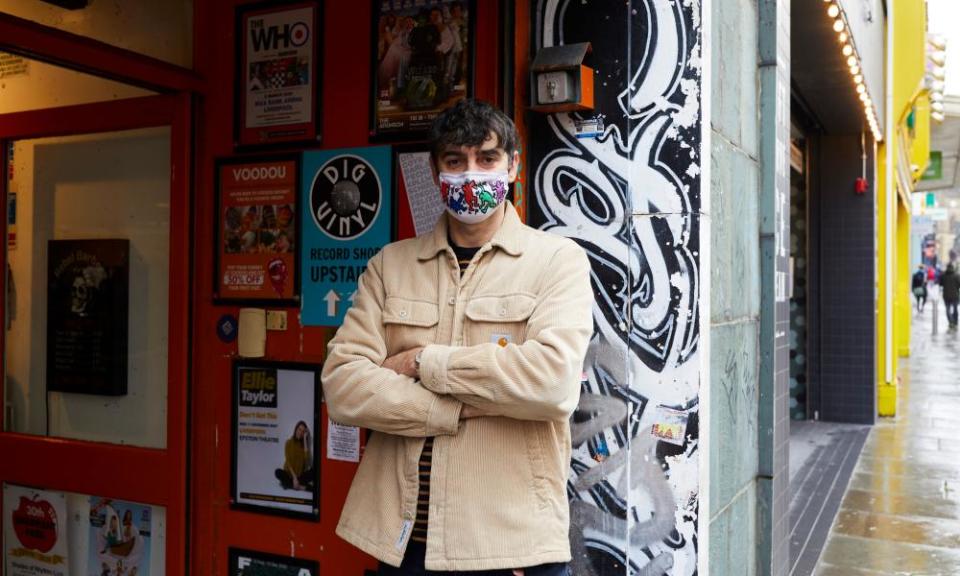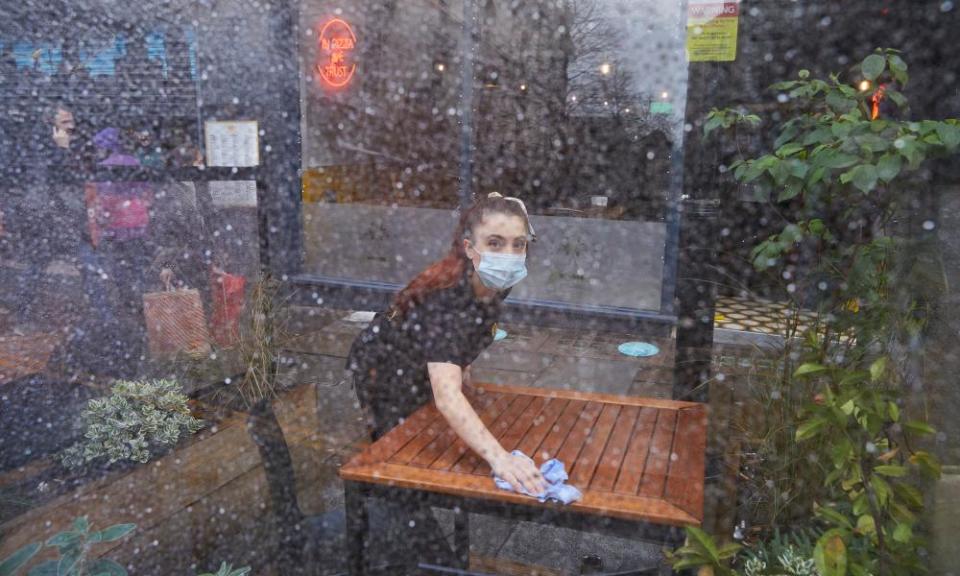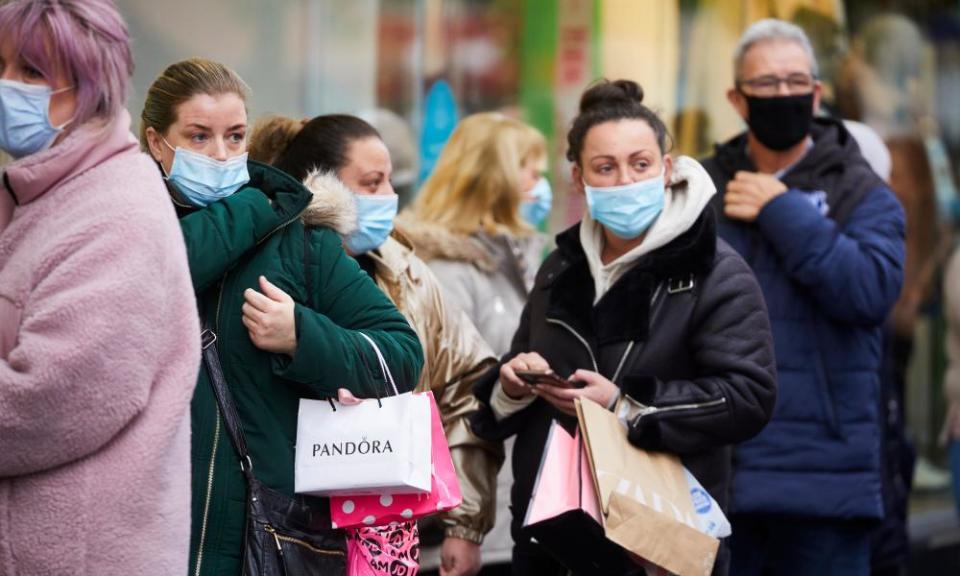'It's lovely to be back': on the streets of three-tier England as lockdown lifts
England’s second national lockdown lifted on Wednesday, with 99% of the population placed under the second and third tiers of a three-tier regime. However, non-essential shops are allowed to open under every tier, giving shop owners hope for a much-needed high street boost ahead of Christmas. The Guardian went out on Wednesday to take the mood across the different zones.
Tier 1: St Ives
The Three Ferrets pub in the Cornish harbour-side town of St Ives was buzzing with chatter and laughter.
“It’s lovely to be back,” said Richard Cockling, 83, a retired merchant seaman and fisherman as he sipped on a celebratory gin and tonic. “I’ve missed this place. The latest lockdown has been the worst – long and boring. I couldn’t wait to get back into this place.”
Keith Tickner, 59, a cleaner, settled down in his usual cosy spot in front of the blazing fire with a group of friends. “You don’t realise how much you miss your mates and your routine until you’re allowed back,” he said.
St Ives, a long-beloved retreat for artists, beach lovers and surfers, was recently judged the happiest place to live in the UK. On the day it and the rest of Cornwall became the only area in mainland England to begin life in tier 1 it felt a jolly town to be in.
From first light, the town was packed with delivery lorries restocking the shops, cafes and restaurants. Bleary-eyed kitchen staff emerged from furlough to begin prepping for dinner time while shopkeepers polished windows and scrubbed floors.
“Look at that cobweb,” said Paul Clegg, a potter who specialises in lucky Cornish piskies, his take on the leprechaun, as he buffed his windows. “This is the best place in the country anyway. So many people who live here came on holiday, then just decided to stay because it’s so nice. But it does feel a particularly good day today.”
Opposite, Sarah Allen was putting up Christmas lights outside her cafe, Sky’s Diner. “It’s good to be back.” She expected to be busy. “I think we’ll get visitors coming from all over the country who want a taste of life in tier 1,” she said.
Cornwall council’s leader, Julian German, called it a “huge moment” for the county but asked people not to drop their guard. “Covid doesn’t care what tier we’re in,” he said.
The advantages of living in tier 1 include being allowed to have a drink in a pub without a meal and to meet in a group of up to six indoors as well as outside.
People from tier 3 areas have been urged by the council not to visit Cornwall and the police this week revealed that up to 10 extra cars would be patrolling Devon and Cornwall to deal with Covid rule-breakers.
The council said people from tier 2 areas should bring the restrictions they are subject to at home with them “like hand luggage”. For example, those in tier 2, should have a “substantial meal” with their pub drink.
Of course, enforcing such rules are difficult. The Pilchard Press, a real ale pub tucked up an alley near the harbour, was taking no chances. It had fixed a notice to its railings reading: “Cornwall residents only”.
At the Golden Lion pub, licensee Matt Squires said he would be politely asking people where they are from if he did not recognise them. “We plan to keep people from different tiers separate,” he said. Locals will be able to use the front bar looking on to the street, visitors the back bar.
Raven Williams, owner of the Common Wanderer outdoor clothes shop, said that tier 1 living would not change much for many people. “It’s good for the shops but actually we live in a bit of a bubble here, close to nature and the water. It’s why people like it.” SM
Tier 2: Liverpool

Vans lined up outside the independent shops and restaurants on Liverpool’s Bold Street in the morning drizzle to deliver stock to eager staff. “We’re feeling festive, we’ve got our Christmas music on and our twinkly lights on,” said Nicki Whatling, a manager at Rennie’s Arts and Crafts, as picture frames were unloaded into the store.
While the shop has only 23 days to make up the bulk of lost sales over lockdown, she said she was hopeful the business could “have a fairly decent December”.
As the day wore on, Whatling’s wishes began to look more likely, with throngs of Christmas shoppers trickling up and down the city’s streets. At the vintage clothes store Resurrection, where students were sifting through leisurewear and parents were picking out gifts, the director Rob Pritchard said there had “been a buzz about the place” in the middle of the day.
Usually, he said, the store would be much quieter in early December after the Black Friday sales weekend, but he predicted the store would continue to be busy throughout this month. “A lot of people are saying they’re taking the chance to get back into the city again. I’ve heard so many people say that today,” he said.

“When we ended the last lockdown some people were still too scared to come out. This time maybe because the infection rates have fallen so much in Liverpool, they don’t seem as scared to come.”
Meanwhile, at the pizza restaurant Crust, the manager Antonio Fornaro was grateful the venue had been able to open ahead of Christmas. “When they announced it, I had calls from all my colleagues saying, ‘Yes! We’re going to be able to open’,” he said.
Throughout England’s second national lockdown, takeaway sales had dropped off as people reigned in spending, said Fornaro. But on Wednesday afternoon, the reduced tables and chairs in the restaurant were full once again.

Outside the trainer store Size?, university student Adam Macholc, 18, was one of a small socially distanced group of sneakerheads waiting for the latest Adidas drop as staff inside got ready to open. “I’m buying them for myself,” he said, adding that despite a turbulent first term, “it feels like there’s a bit more hope” after the news that the UK had approved the Pfizer/BioNTech vaccine.
In Liverpool’s main commercial shopping district, around the Liverpool ONE shopping centre, other shoppers seemed to be feeling confident too. A queue snaked around the city’s Primark store, while shoppers trickled in and out of Debenhams to pick up a bargain.
Willing some of them to stop for a substantial meal and a drink on their way home, was the manager of the Doctor Duncan’s pub, Amy McCarthy. Under tier 2 regulations, a key difference with tier 1 is alcohol cannot be served without food and there must be no multiple household mixing in venues like Doctor Duncan’s. The pub, located away from the main shopping centre next to Liverpool Lime Street station, had a quiet day with only a handful of customers.
“We’re right next to the bus stops where people usually head to football games and are known for being the first and the last stop. So it’s different territory for us having to emphasise our pub grub,” she said. AW
Tier 3: Nottingham
After a month cooped up indoors, shoppers in Nottingham seized the opportunity to return to the city centre on Wednesday.
The east Midlands city is back in tier 3, and is therefore subject to England’s toughest coronavirus restrictions. Shops, hair salons and gyms have been allowed to reopen, but hospitality venues must offer takeaway or delivery only.
In the city centre, stallholders were preparing for this weekend’s opening of the Christmas market on Old Market Square, in the heart of the city.
The prime location is overlooked by an imposing six-storey stone building which houses the department store Debenhams, and on the other side of the square is a Dorothy Perkins and a Burton – brands that are part of Philip Green’s Arcadia empire. Both Debenhams and Arcadia are living on borrowed time, having collapsed into administration on consecutive days this week
If Arcadia’s brands do not find a buyer, Nottingham will feel the impact of store closures keenly. The city is home to nine Arcadia stores – .
Tallulah Harries-Pugh, 29, was holding a Topshop carrier bag, but with an item to return rather than a new purchase.
“I don’t agree with Sir Philip Green’s ethics, and I try not to shop [at Arcadia brands],” said Tallulah. But she said she was worried about the staff, and what more store closures would mean for the high street.
The scars of another recent retail collapse are clearly visible in Nottingham city centre. One of the city’s two shopping centres, Broadmarsh, was half-demolished with plans under way for a multimillion pound redevelopment, when its owner, the retail property company Intu, collapsed in June.
The city council has been handed the keys to the development and has already spent £19m on the project. Councillor Sam Webster, whose ward covers the city centre, concedes it won’t be a “quick fix”.
“It is a challenge, but it is also an opportunity. The project is probably the biggest regeneration in a core city in the country”.
In the short-term, however, Nottingham’s businesses have to contend with tier 3 restrictions.
Prof David Paton from Nottingham University business school warns that retailers will feel the impact of cafe, pub and restaurant closures. “There is a lot of interlinkage between high street hospitality and shops. Nottingham is going to face that, as all tier 3 will.”
In a normal year the nine stainless steel fermenting vessels at the Castle Rock brewery near the city’s train station would be full, ahead of the expected peak in demand during the festive season. This December they are empty.
“We won’t brew again before Christmas,” said the managing director, Colin Wilde. The brewer and pub operator has 22 sites in Nottingham and across the east Midlands, all in tier 3.
The company now offers takeaway alcohol from its brewery and pubs, but it brings in less than 10% of normal trade, and Wilde said the closed pubs “leak cash”.
“As a sector, we feel like canaries in a cage. It feels like politicians are testing things out on the hospitality sector and don’t think it matters if it dies.” JP

 Yahoo Finance
Yahoo Finance 